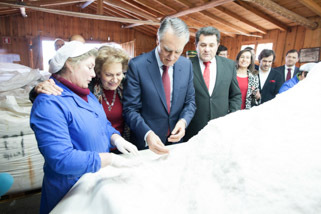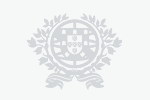

The President of the Republic sent a message to Parliament regarding the return of the decree approving the Law on Pluralism and Non Media Concentration.
Following is the text of the President of the Republic’s message:
“Mister Speaker,
Excellency,
Having received, to be enacted as law, Parliamentary Decree No. 265/X, which approves the Law on pluralism and non media concentration, I have decided, in the terms of article no. 136 of the Constitution of the Republic, not to enact it, based upon the following premises:
1 – Freedom of the press is a fundamental value of the democratic Rule of Law, together with freedom of expression and information which, in accordance with article no. 37 of the Constitution, includes the right to inform, to obtain information and to be informed.
The Constitution also determines, under no. 4 of article no. 38, that the State shall ensure the freedom and the independence of the media and restrain its concentration, specifically through multiple or cross shareholdings.
2 – As such, the approval of measures to guarantee the pluralism of the media and to restrain that its concentration may, at the limit, represent a threat to freedom of the press and information, cannot be placed in doubt.
3 – The relevance of this issue is such that it is under consideration of community institutions, and reference should be made to the «Commission Staff Working Document – Media pluralism in the Member States of the European Union» [SEC (2007)32] », which expressly refers that the indicators capable of objectively and materially rating the «real» pluralism of the media in the several States of the Union have not yet been identified.
In this document, the European Commission assumed the obligation to present a study which may identify such indicators, which will be carried out by Louvain University, and which should be completed in mid 2009, in accordance with official information made available by the «Task Force for Co-ordination of Media Affairs».
4 – It is thus immediately questionable that such a far reaching and deep change should have required introducing in the industry at a time when the European Union has this issue under consideration, whilst at the same time it does not appear that in our country, possible contrary to what may be the case in other countries, there is a deficit in media pluralism that would justify urgency in issuing such legislation.
5 – It is not by chance that this decree brings about its own precariousness when safeguarding, under no. 3 of article no. 21, the application of the provisions of Community Law which, following the work and discussions under way, will be issued.
6 – The legislation now approved may thus shortly reveal itself as nonconforming with Community Law or fall short of the measures therein provided to guarantee, in such a sensitive area, pluralism of information and the transparency of the ownership of the means of communication. The provisions that rule this activity must not only be stable but it is highly advisable, especially due to the growing internationalization of investments in this sector, that such rules are harmonized in the European area, and no unnecessary contribution should be made towards the loss of competitiveness of our national media groups.
7 – Moreover, it should be noted that exactly due to the relevance of this issue for the safeguard of the democratic Rule of Law, the Constitution specifically imposes, under article no. 186, no. 6, item a), that the law regarding the media regulator shall be approved by an ample majority – two thirds of the Members of Parliament. It is for this reason that this regulator has special responsibilities as to how severely and independently it exercises its mission. It is also for this reason that issues concerning freedom of information should politically be the object of an inter-party and plural consensus, which was now not the case, and that a special effort is thus justified to obtain such a result.
8 – The joint consideration of articles nos. 20 and 21 of this legislation, as to ascertaining the risks for pluralism and independence, raises a great number of issues.
9 – To start with, the quantifying of the percentages referred to in article no. 20 will be carried out by «rating tools recognized in the media environment». However, the use of this indeterminate concept, which article no. 2 of the decree does not substantiate, could be the cause of great instability in the industry, since there is no consensus as to the credibility of several of the rating tools currently in use.
For this reason a measure of this type should only become applicable after a general acceptance is obtained as to the rating tools which will measure the average circulation per edition, in the written press, and the audiences, in radio and television. If not, the application of this regime could lead the companies with larger audiences to stop recognizing the credibility of such rating tools, which could give rise to serious problems in the industry and could have self-defeating effects even if just to achieve greater transparency in the market.
10 – This gives rise to a paradox that must be taken into consideration. This decree has, in this case, the objective to increase the control of public bodies over the companies; however, the tool which it uses for the purpose of control – in effect, the basis of all the checking structure – is that which the private operators may or may not recognize as credible. Should it no further be «recognized in the media environment» (article no. 20), the measuring tool will no further be used as a reference standard – and, thus, as a control standard. From this paradoxical convergence between an increase of public intervention, as to the objectives, and a dependence upon private recognition, as to the designs, serious problems could emerge for the future of the media in Portugal.
11 – On the other hand, also, the provisions of article nº. 21 assume its own precariousness, when stating «without prejudice to the [indicators of pluralism and independence] that come to be adopted by community law», which proves, once more, the lack of opportunity of this decree.
12 – It can also always be questioned if the indexing criterion of the «influence» of a certain media operator is, after all, its receptivity with the public. If it is correct that, in abstract, a larger audience will correspond to a bigger «influence», it is no less correct to state that this could lead to the sanctioning of those which, due to their merit and the quality of their product, could capture larger audiences.
13 – The situation becomes more delicate when what could be foreseen, in respect of the more successful companies would, in some way, be a «reversal of the onus of proof», by having to demonstrate that their success is not that which is evidenced by the rating tools – which, on the one hand, is absurd in market terms (at the limit, a company would be demonstrating that it does not have the success attributed to it), as it is damaging to the credibility of the rating tools. As such, if a company is able to prove that the rating tools are not credible – a hypothesis that is expressly foreseen in article no. 21 – all the credibility and all the operation of this appraisal system are placed in doubt.
14 – This is, in effect, one of the structural weaknesses of the mechanics of «appraisal of powers of influence»: its whole operation is based on a measuring tool which is not specifically indicated and, more than this, depends upon the acceptance of those who are targeted.
Indeed, this decree endeavours to assess a qualitative, diffuse and not very tangible component (the «influence») through quantitative standards that are assessed by technical procedures which, at this stage, have not yet achieved full credibility, thus requiring «recognition by their own environment». Anyway, what is the «environment» and how is «recognition» materialized?
Added to which is that the possibilities of defence provided to the companies targeted are equally based on indeterminate concepts («existence of expression and comparison of differing currents of opinion», «instruments for the safeguard of the independence of journalists and directors», «diversity of editorial guidelines»), which, at the limit, will end by conferring upon the regulator a deciding power with contours which are difficult to assess and even difficult to scrutinize publicly.
15 – All this derives from a basic scenario which should be carefully considered. Articles nos. 20 and 21 of this decree, originate from two essential ideas: (1) that a larger audience is a synonym of greater influence; (2) that greater influence is necessarily a risk for pluralism and independence. However, none of these ideas have been demonstrated as true. Even with a restricted audience, a publication may be extremely «influent». And the fact of being «influent» does not lessen independence – this capability to influence may derive exactly from its stamp of pluralism and independence in the face of power. On the contrary, the circumstance that a given company has a large acceptance with the public does not necessarily mean that this company is less independent – its success may provide it with greater soundness and, consequently, greater independence in the face of political and other powers.
16 – In short, this decree intends to achieve a salutary objective – the independence of means of communication -, starting from a questionable scenario: that a greater or lesser independence of a media operator is appraised by the level of acceptance it has with the public.
17 – The restriction to the access of public bodies to media activities, as established in article no. 13 of this decree, should also be subject to consideration, without prejudice to the recognition, which I have always defended, that companies in this sector should, as a rule, be privately owned.
18 – It is important to remember that, in the terms of the Constitution, there cannot be any sectors of the economy closed to the State or other public bodies, with the coexistence of sectors of ownership safeguarded by article no. 82 of the Fundamental Law.
19 – As such, in the current economic environment, and even to safeguard the independence of the media, the possibility that the State or other public bodies, as was the case with other sectors, may not have the imperative need to intervene in this area of the economy, cannot be excluded ab initio.
20 – However, the terms in which the restriction to access is foreseen in article no. 13, does not allow that possibility, as it closes to the State and other public bodies the possibility to develop activities in an area of the economy which could place at issue the pursuit of important public interests, including the pluralism and the independence of the media in themselves.
For the above reasons I have decided, in the terms of article no. 136 of the Constitution of the Republic, not to enact Parliamentary Decree no. 265/X.
With my highest consideration,
THE PRESIDENT OF THE REPUBLIC
Aníbal Cavaco Silva”
© 2006-2016 Presidency of the Portuguese Republic
You have gained access to the records of the Official Site of the Presidency of the Republic from 9 March 2006 to 9 March 2016.
The contents available here were entered in the site during the 10 year period covering the two mandates of President of the Republic Aníbal Cavaco Silva.